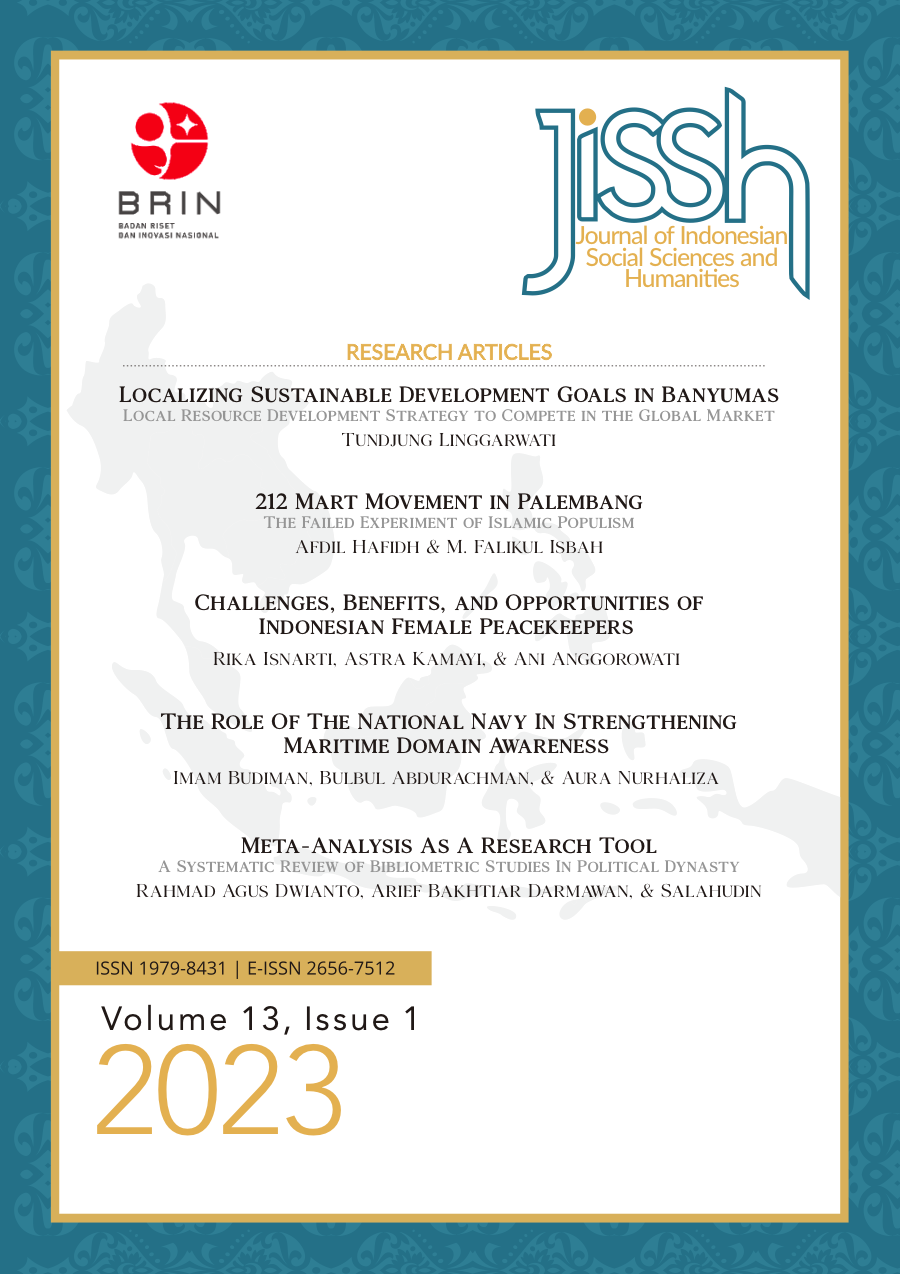Meta-Analysis As A Research Tool: A Systematic Review of Bibliometric Studies In Political Dynasty
Keywords:
Bibliometric, Democracy, Nvivo, Political Dynasty, VOSviewerAbstract
Political dynasty practice in many democracy countries and sign of the flaws of democratic political systems in recent decades. It shows the inequality of justice, a crisis of trust, and democratic legal policies because families or groups controlled the government. The bibliographic review study examines the theory and practice of political dynasty in democratic countries through a different approach from the previous one, namely through literature studies of many Scopus indexed scientific articles from qualified researchers in the political field. Systematically bibliometric review can examine the study comprehensively and complete. The analysis uses VOSviewer and Nvivo to create linkage of the topic, grouping theme, mapping the dominant theme of a political dynasty. Based on cluster analysis with NVivo 12 plus sourced from 60 Scopus indexed articles, there are six clusters and five main topics about dynastic politics in a democratic country.
References
Aliotta, J. M. (2007). The Impact of Women in Congress. Perspectives on Politics, 5(04). https://doi.org/10.1017/s1537592707072404
Asako, Y., Iida, T., Matsubayashi, T., & Ueda, M. (2015). Dynastic politicians: Theory and evidence from Japan. Japanese Journal of Political Science, 16(1), 5–32. https://doi.org/10.1017/S146810991400036X
Bó, E. D. A. L., Bó, P. D. A. L., & Snyder, J. (2009). Political Dynasties. Review of Economic St, 76, 115–142.
Feinstein, B. D. (2010). The dynasty advantage: Family ties in congressional elections. Legislative Studies Quarterly, 35(4), 571–598. https://doi.org/10.3162/036298010793322366
Geys, B. (2017a). Political Dynasties, Electoral Institutions and Politicians’ Human Capital. Economic Journal, 127(605), F474–F494. https://doi.org/10.1111/ecoj.12444
Geys, B. (2017b). Political Dynasties, Electoral Institutions and Politicians’ Human Capital. Economic Journal, 127(605), F474–F494. https://doi.org/10.1111/ecoj.12444
Guritno, D. C., Samudro, B. R., & Soesilo, A. M. (2019). The paradox of political dynasties of regeneration type and poverty in regional autonomy era. International Journal of Ethics and Systems, 35(2), 179–194. https://doi.org/10.1108/IJOES-05-2018-0069
Isaev, I., Kornev, A., Lipen, S., & Zenin, S. (2020). The “machine of power” and aspects of political balance. Quaestio Rossica, 8(3), 979–992. https://doi.org/10.15826/qr.2020.3.507
Mendoza, R. U., Beja, E. L., Venida, V. S., & Yap, D. B. (2012). Inequality in democracy: Insights from an empirical analysis of political dynasties in the 15th Philippine Congress. Philippine Political Science Journal, 33(2), 132–145. https://doi.org/10.1080/01154451.2012.734094
Mendoza, R. U., Beja, E. L., Venida, V. S., & Yap, D. B. (2016). Political dynasties and poverty: measurement and evidence of linkages in the Philippines. Oxford Development Studies, 44(2), 189–201. https://doi.org/10.1080/13600818.2016.1169264
Mendoza, R. U., Cruz, J. F. P., & Alungal, U. (2014). Do Socio-Economic Conditions Influence Dynastic Politics? Initial Evidence from the 16th Lok Sabha of India. RSN-PCC Working Paper.
Mukti, H.U., & Rodiyah, R. (2020). Dynasty Politics in Indonesia: Tradition or Democracy? Journal of Law and Legal Reform, 1(3), 531-538. https://doi.org/10.15294/jllr.v1i3.36702
Muslikhah, U., Hajri, W. A., & Santoso, D. (2019). Political dynasty and its implications for people’s welfare. International Journal of Innovation, Creativity and Change, 10(2), 246–252.
Purdey, J. (2016). Narratives to power: The case of the Djojohadikusumo family dynasty over four generations. South East Asia Research, 24(3), 369–385. https://doi.org/10.1177/0967828X16659728
Querubin, P. (2016). Family and politics: Dynastic persistence in the philippines. Quarterly Journal of Political Science, 11(2), 151–181. https://doi.org/10.1561/100.00014182
Reyes, J. A. L., Arce, B. G. C., & Madrid, N. B. N. (2018). Do money, power, family and connections really matter in politics? Analysing factors of success in the 2010, 2013 and 2016 Philippine senatorial elections. Copenhagen Journal of Asian Studies, 36(2), 28–51. https://doi.org/10.22439/cjas.v36i2.5648
Romli, L., Noor, F., & Rohman, R. (2023). Democracy, Decentralization and Political Dynasty: A Case Study of Banten. Journal of Social and Political Sciences, 6(3), 185-198. https://doi.org/10.31014/aior.1991.06.03.436
Rosser-Owen, M. (2014). Andalusi spolia in medieval Morocco: “Architectural politics, political architecture.” Medieval Encounters, 20(2), 152–198. https://doi.org/10.1163/15700674-12342164
Rossi, M A. (2017). Self-perpetuation of Political Power. Economic Journal, 127(605), F455–F473. https://doi.org/10.1111/ecoj.12443
Rossi, Martín A. (2017). Self-perpetuation of Political Power. Economic Journal, 127(605), F455–F473. https://doi.org/10.1111/ecoj.12443
Rubí, G. (2019). Oligarchic liberalism, caciquism and political democratisation between 1876 and 1923. The Catalan case. Catalan Historical Review, 12, 73–86. https://doi.org/10.2436/20.1000.01.157
Ruud, A. E., & Nielsen, K. B. (2018). Political Dynasticism: Networks, Trust, Risk. Studies in Indian Politics, 6(2), 157–167. https://doi.org/10.1177/2321023018797407
Tusalem, R. F., & Pe-Aguirre, J. J. (2013). The effect of political dynasties on effective democratic governance: Evidence from the Philippines. Asian Politics and Policy, 5(3), 359–386. https://doi.org/10.1111/aspp.12037
Van Coppenolle, B. (2017). Political Dynasties in the UK House of Commons: The Null Effect of Narrow Electoral Selection. Legislative Studies Quarterly, 42(3), 449–475. https://doi.org/10.1111/lsq.12164
Villanueva, J. E. B. (2020). Political Dynasties and Human Development Investments: Evidence of Linkage from Rizal Province, Philippines. Philippine Journal of Public Administration, 64(2), 90-126.
Virola, R. A., Agtarap, K. F. S., Villanueva, P. C., & Villaruel, M. L. C. (2016). The 2016 elections and the Good Governance Index: Performance, promises, or political dynasties? Philippine Statistics Authority. https://psa.gov.ph/content/2016-elections-and-good-governance-index-performance-promises-or-political-dynasties-0
Downloads
Published
Issue
Section
License

This work is licensed under a Creative Commons Attribution-ShareAlike 4.0 International License.
Authors who publish with this journal agree to the following terms:
1. Authors retain copyright and grant the journal right of first publication with the work simultaneously licensed under an Attribution-ShareAlike 4.0 International (CC BY-SA 4.0) license. This license allows others to remix, adapt, and build upon the work, as long as they credit the author and license their new creations under the same terms.
2. Authors may enter into separate, additional contractual arrangements for the non-exclusive distribution of the journal’s published version of the work (e.g., posting it to an institutional repository or including it in a book), provided there is an acknowledgment of its initial publication in this journal.
3. Authors are permitted and encouraged to post their work online (e.g., in institutional repositories or on their personal website) prior to and during the submission process, as this can lead to productive exchanges and increase citations of the published work (See The Effect of Open Access ).


















